- Reliable Robotics has completed the first flight of a remotely operated Cessna 208B without a pilot on board.
- The drone company aims to achieve flight automation technology certification in 2025 to operate uncrewed flights carrying commercial cargo using the Cessna 208B.
- Reliable Robotics believes that operational flights with actual cargo will only begin after certification approval.
Reliable Robotics stated in the ‘Cargo Facts Connect’ podcast that it aims to certify its flight automation technology officially by 2025. In a major step towards its goal, the company had successfully flown a remotely managed Cessna 208B with no pilots on board. The co-founder and CEO of Reliable Robotics, Robert Rose, emphasized that certification for uncrewed flight operations involves a complex set of activities around organizational adjustments, safety analysis, and procedural developments.
Rose suggested that the FAA (Federal Aviation Administration) has been supportive and helped make operational changes to ensure full safety. Despite the common perception of the FAA being slow or resistant to uncrewed aircraft technology, Rose insisted that “the FAA wants to innovate” and be at the forefront of technological advancement.
On testing and operations, Rose revealed that the flight did not contain any cargo. The company will only begin testing with actual cargo on board after certification. As for continued testing, Rose expects a combination of flight evaluations with a supervising pilot onboard and those without. Future tests will also aim to demonstrate the system’s working efficiency through all phases of operation to meet certification requirements.
As the FAA stresses the importance of safety data and analysis in certifying autonomous flying applications, Reliable Robotics is also focusing on building detailed data on uncrewed aircraft systems. This includes running various simulations to test the aircraft’s responses under different scenarios. This certification process, analysis, and testing will equip FAA better in understanding the complexities of operating an uncrewed aircraft.
